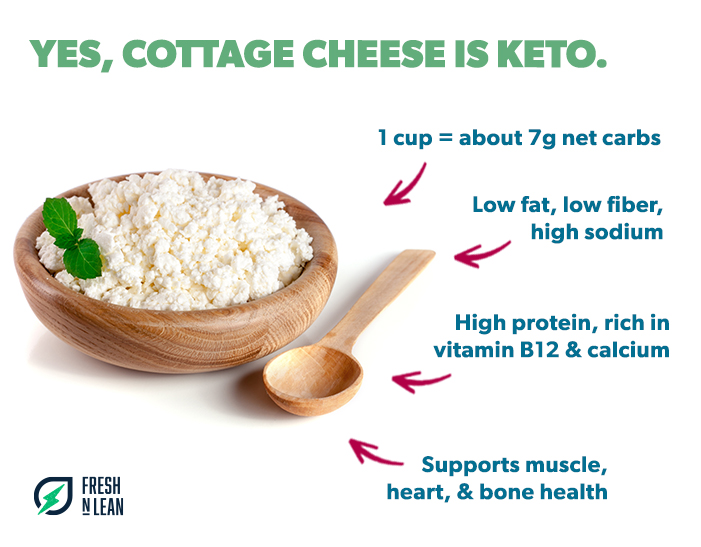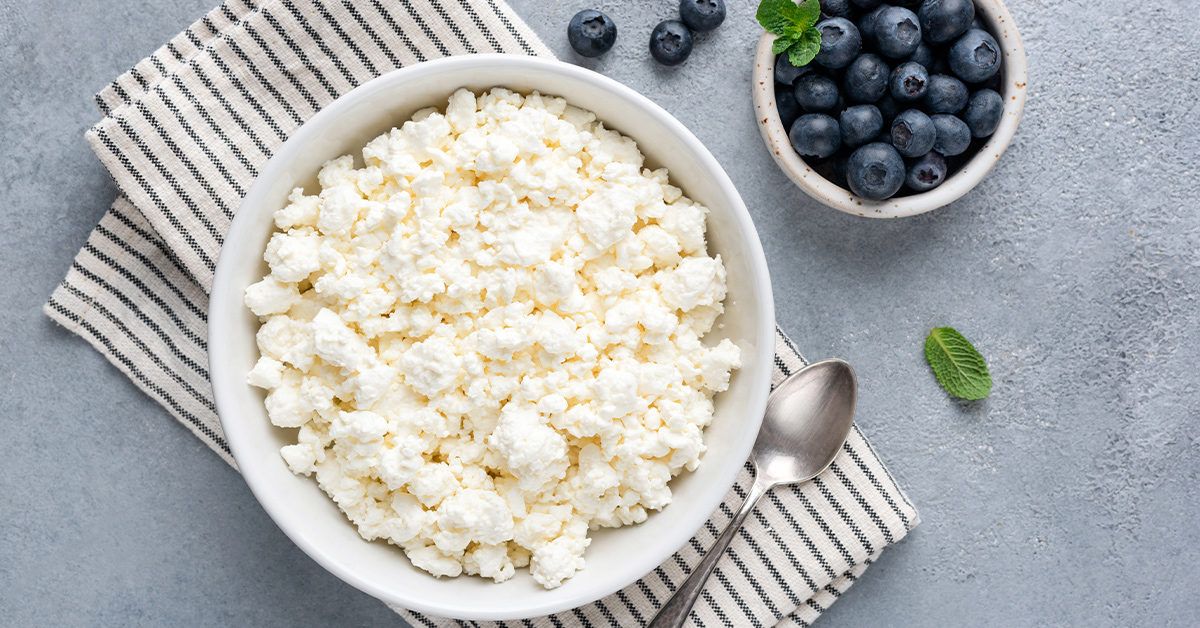Could including cottage cheese in your keto diet be the next big thing? With its rich profile of nutrients and low carbohydrate content, cottage cheese is gaining momentum among keto enthusiasts. This humble dairy product not only satisfies cravings but fits neatly into the macro guidelines of a ketogenic lifestyle.
Cottage cheese has been a staple in nutritious diets for centuries. Loaded with protein and offering a mere 3-4 grams of carbs per half-cup, it aligns well with the keto diet’s focus on low carbohydrate intake. Many find it to be a satisfying and convenient option, making it easier to adhere to keto dietary restrictions.

Understanding the Keto Diet
The keto diet is a popular low-carb eating plan. It focuses on high fats and moderate proteins. The goal is to shift your body into a state called ketosis.
In ketosis, your body burns fat for energy instead of carbohydrates. This can lead to weight loss and increased energy levels. Many people find this shift beneficial for both physical and mental performance.
A typical keto diet includes foods like meat, fish, eggs, cheese, and healthy fats such as avocado and olive oil. Carbohydrate consumption is very restricted. Usually, it’s limited to 20-50 grams per day.
The keto diet may have some side effects, especially when starting out. Common issues include fatigue and digestive problems. However, many people adjust within a few weeks, feeling more energetic and focused.
An Overview of Cottage Cheese
Cottage cheese is a versatile dairy product loved by many. It’s rich in protein and offers various health benefits. Understanding its composition and production can help you incorporate it better into your diet.
Nutrition Facts and Benefits
Cottage cheese is low in calories but high in protein, making it a popular choice for health-conscious individuals. A half-cup serving typically contains:
- 80-100 calories
- 11-13 grams of protein
- 1-2 grams of fat
This makes it an excellent snack for those looking to manage their weight and build muscle.
Production Process
The process of making cottage cheese begins with curdling milk. Adding an acid or rennet causes the milk to separate into curds and whey. The curds are then cut, cooked, and washed to remove any lingering whey.
The washing step helps remove lactose, which is beneficial for those with lactose intolerance. Finally, the curds are salted and packaged for sale.
Varieties and Uses
Cottage cheese comes in various forms, including small-curd, large-curd, and non-fat options. It can be eaten plain or mixed with fruits and vegetables. Many people also use cottage cheese in recipes like salads and desserts.
This versatility makes it a staple in many kitchens. You can tailor the type of cottage cheese to suit your specific dietary needs.
The Role of Cottage Cheese in a Keto Diet
Cottage cheese is a great fit for a keto diet due to its low carb content. A half-cup serving usually contains just 3-4 grams of carbohydrates. This helps easily keep your daily intake within keto guidelines.
It’s also packed with protein, offering 11-13 grams per serving. Protein is essential for muscle maintenance and repair, especially when carbs are restricted. Cottage cheese’s high protein content makes it a valuable addition to any keto meal plan.
Fats are another important component of the keto diet, and cottage cheese provides a moderate amount. This helps meet your fat intake requirements, helping maintain ketosis. You can even mix it with high-fat ingredients like avocado or nuts for a more balanced meal.
The versatility of cottage cheese makes it easy to incorporate into various keto recipes. From savory dishes to sweet treats, it blends well due to its mild flavor. This allows for creativity in the kitchen while staying keto-friendly.
Ways to Incorporate Cottage Cheese into Your Keto Diet
Cottage cheese can be a versatile addition to your keto diet. One simple way is to use it as a base for savory dips. Mix it with herbs and spices for a delicious, low-carb snack.
If you have a sweet tooth, cottage cheese also works well in desserts. You can blend it with berries and a keto-friendly sweetener. This makes for a creamy, satisfying treat that fits your diet.
You can also add cottage cheese to your keto smoothies. It boosts the protein content without adding many carbs. This is perfect for a post-workout snack or a quick breakfast.
For a hearty meal, consider topping your salads with cottage cheese. It pairs well with leafy greens, nuts, and seeds. This adds both flavor and nutrition to your meal.
Another option is to use cottage cheese in baked goods. Keto-friendly recipes like muffins or pancakes can benefit from its moisture and protein. This keeps your treats keto-compliant while enhancing their texture.
Lastly, don’t forget about savory dishes. Mix cottage cheese into scrambled eggs or use it as a stuffing for chicken. These meals are not only delicious but also keep you on track with your keto goals.
Other Dairy Alternatives in a Keto Diet
If you’re not a fan of cottage cheese, several other dairy alternatives fit into a keto diet. Greek yogurt is an excellent option due to its high protein and low carbohydrate content. Choose full-fat versions to keep your fat intake high.
Hard cheeses like cheddar and gouda are also keto-friendly. They are rich in fats and very low in carbs. You can use them in various dishes or as a snack.
Heavy cream is another staple in many keto kitchens. It’s perfect for making rich sauces and adds creaminess to coffee and desserts. Just be cautious of portion sizes to avoid overconsumption of calories.
For those seeking a liquid dairy option, unsweetened almond milk is a good choice. It contains fewer carbs compared to regular milk. Make sure to choose versions that are fortified with calcium and vitamins.
If you’re looking for a higher protein alternative, whey protein isolate powders can be used in shakes and smoothies. They are low in carbohydrates and help meet your protein needs. Look for brands without added sugars to ensure you stay within keto guidelines.
Success Stories and Case Studies
Many people have found success incorporating cottage cheese into their keto diets. One notable example is Sarah, a 35-year-old mother who lost 25 pounds. She regularly added cottage cheese to her salads and snacks.
Another inspiring story is of Mark, a fitness enthusiast. He used cottage cheese as a post-workout protein source, shedding body fat while gaining muscle. Mark credits the high protein content for his improved recovery times.
These case studies show that cottage cheese can be a valuable addition to a keto lifestyle. Different people have used it in unique ways to meet their nutritional goals. The versatility and nutritional benefits make it a favored option.
A recent study also supports these anecdotal successes. Researchers found that participants who included cottage cheese in their keto diet showed more significant fat loss. This was compared to those who did not include dairy.
Real-life examples and studies emphasize the effectiveness of cottage cheese in a keto diet. By providing essential proteins and fats, it helps in weight management and muscle retention. These success stories can serve as motivation for others.
Key Takeaways
- You can eat cottage cheese on a keto diet.
- Cottage cheese is low in carbs and high in protein.
- Choose full-fat varieties for better keto compliance.
- Avoid adding sugars to keep it keto-friendly.
- This dairy product aids in maintaining ketosis.

Frequently Asked Questions
If you’re curious about incorporating cottage cheese into your keto diet, you’re not alone. Here are some common questions and answers to help guide you.
1. What are the nutritional benefits of cottage cheese in a keto diet?
Cottage cheese is packed with protein, essential for muscle repair and growth. It also offers a good amount of healthy fats when you choose full-fat varieties.
Additionally, it’s low in carbs, making it perfect for keto dieters. The combination of protein and fat helps keep you fuller longer, reducing hunger pangs.
2. Can I use cottage cheese in keto-friendly recipes?
Absolutely! Cottage cheese is incredibly versatile and can be used in numerous recipes. You can add it to salads, make dips, or even use it as a topping for keto pancakes.
You can also blend it into smoothies for an extra creamy texture. The options are almost endless, giving you plenty of culinary flexibility while staying on your keto plan.
3. Is there a difference between regular and full-fat cottage cheese for keto?
Yes, opting for full-fat cottage cheese is better suited for a keto diet. Full-fat versions have more healthy fats that support ketosis, compared to reduced or fat-free options.
Avoid products labeled “low-fat” or “fat-free.” They often contain added sugars or carbs that could disrupt your ketosis process.
4. Are there any drawbacks to eating cottage cheese on a keto diet?
The primary drawback is its sodium content; some brands have high salt levels which can lead to bloating or increased blood pressure if consumed excessively.
If you’re sensitive to dairy, cottage cheese might cause digestive issues like bloating or gas. It’s always best to monitor how your body reacts and opt for fresh varieties whenever possible.
5. How much cottage cheese should I eat daily on a keto diet?
The amount you should eat depends on your individual dietary needs and goals. A half-cup serving is usually sufficient but adjust according to your daily carb limit.
It’s important not to overconsume as too much protein can impact ketosis levels. Always balance it with other sources of fats and proteins in your meals.

Conclusion
Incorporating cottage cheese into a keto diet can be both delicious and beneficial. With its low carb content and rich protein profile, it seamlessly fits into keto guidelines. This makes it a versatile ingredient for various recipes.
Whether in smoothies, salads, or desserts, cottage cheese can enhance your keto meals. Just remember to choose full-fat varieties and avoid added sugars. This ensures you stay on track with your dietary goals while enjoying tasty dishes.
